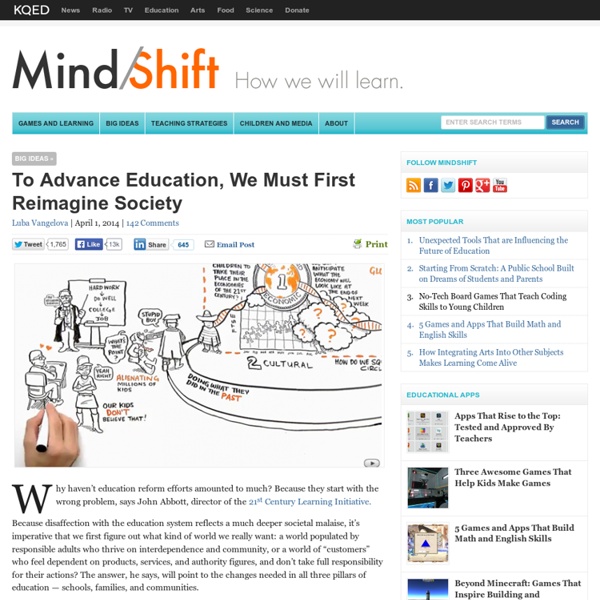Hackschooling
Jason, what's with the John Lennon quote? It's a great quote, but unless someone has explicitly told you otherwise, it has nothing to do with Logan any more than it has to do with your story above; which might be fine less the need to somehow single out your obsession with John Lennon (who's great but your making big reaches; not a good sign). It's not really necessary to try and make a great link in the specific way you have, between a good historical quote and some necessity by Logan to somehow tell the audience; "Hey, everything I've done is from John Lennon." If you read-up, Logan re-wrote his entire talk he had worked on for some 60 days, just prior to this TEDx event because he wasn't quite happy with it and asked others for advice. Finally, I have to address this privilege thing you refer to.
A story of education before technology | Pearson Blog
I don’t feel I was at school too long ago. I finished in 1997, after sixth-form. But this week I was reminded that people born in 1997 are now legally adults. As I was leaving school, they were entering the world. Then after wondering how I had changed, I began to ponder how education in my lifetime has changed; which is largely the pondering of the impact of technology. While at school (in the UK) I did have access to a computer suite – a room full of BBC computers where we were able to attempt some word processing and basic programming. Off to university in 1997, and surely this would be the step change. But what was this I heard – final dissertations had to be submitted ‘online’. I hope it’s not from a naivety of relative affluence that I presume most new college goers won’t start their studies struggling, like I did, to buy a computer. That today’s students take their technology for granted is a very, very good thing indeed for education.
How Engaged Are Students and Teachers in American Schools?
By Anya Kamenetz, Hechinger Report Gallup recently released a major report on the State of American Schools. Their data paints a picture of schools performing as a complex ecosystem, with the wellbeing, engagement, and performance of teachers, students, and principals all intertwined. The report combines decades of surveys of 5 million American teachers and principals with the results of the Gallup Student Poll, now billed as the largest survey of American students with 600,000 5th through 12 grade participants, and several large follow-up studies. “The real bummer is [teachers] don’t feel their opinions matter.” The Gallup polls ask students, teachers, principals, and other professionals about their levels of hope, emotional engagement, and well-being at work or school. Brandon Busteed, the executive director of Gallup Education, says that in some ways, the point Gallup is making with this line of research is even more “provocative.” So how are we doing on these soft measures? Related
Don't Go Back to School: How to Fuel the Internal Engine of Lifelong Learning
by Maria Popova “When you step away from the prepackaged structure of traditional education, you’ll discover that there are many more ways to learn outside school than within.” “The present education system is the trampling of the herd,” legendary architect Frank Lloyd Wright lamented in 1956. Half a century later, I started Brain Pickings in large part out of frustration and disappointment with my trampling experience of our culturally fetishized “Ivy League education.” I found myself intellectually and creatively unstimulated by the industrialized model of the large lecture hall, the PowerPoint presentations, the standardized tests assessing my rote memorization of facts rather than my ability to transmute that factual knowledge into a pattern-recognition mechanism that connects different disciplines to cultivate wisdom about how the world works and a moral lens on how it should work. People who forgo school build their own infrastructures. I learned how to teach myself.
David Foster Wallace's timeless graduation speech on the meaning of life, adapted in a short film"
by Maria Popova “The real value of a real education … has almost nothing to do with knowledge and everything to do with simple awareness.” On May 21, 2005, David Foster Wallace got up before the graduating class of Kenyon college and delivered one of history’s most memorable commencement addresses. It wasn’t until Wallace’s death in 2008 that the speech took on a life of its own under the title This Is Water, and was even adapted into a short book. UPDATE: The David Foster Wallace Literary Trust exemplifies everything that’s wrong with copyright law. The most obvious, important realities are often the ones that are hardest to see and talk about. Hear the full speech in its sublime entirety, along with transcript and highlights, here, then wash it down with Wallace on ambition and why writers write. Thanks, Matt Donating = Loving Bringing you (ad-free) Brain Pickings takes hundreds of hours each month. You can also become a one-time patron with a single donation in any amount: Share on Tumblr



